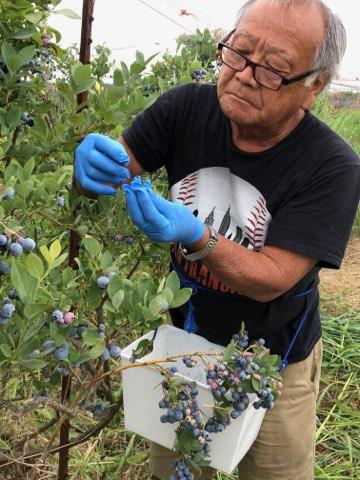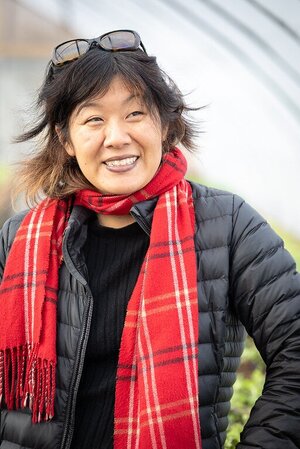
By Amy Wu
Farming often equates to confronting adversity, whether it’s a sudden change in the weather, labor shortage, or broken irrigation - depending on the day. Add onto that a global pandemic and another year of raging fires. Our food distribution systems are suddenly disturbed, with widespread impacts to communities and the economy as we know it. Suffice it to say, farmers have had to rapidly find ways to adapt during this crisis.
This interview is part of a special series of stories by EcoFarm from a diversity of farmers across the U.S. to convey how they are overcoming these challenging times. We hope that their stories will amplify their work, their insights will uplift others, and this series may serve as a meaningful historical document in a changing world.
Larry Hirahara will be presenting at EcoFarm 2021 workshop "Untold History: Asian Farmers in California". Register for EcoFarm Conference to hear more stories from Larry and others.
photo courtesy of Larry Hirahara
Larry Hirahara
Larry Hirahara Family Farm
Madera, California
Larry Hirahara is the founder and owner of Larry Hirahara Family Farm in Madera, a 16-acre farm that is split between organic grapes for raisins and six acres of organic blueberries. Hirahara, 71, launched the farm in 1998 and had it officially certified organic in 2002. He was motivated by its growing popularity with consumers, and, after coming to know some cancer survivors he “decided to go commercial pesticide free.”
A third-generation Sansei Japanese-American grower, Hirahara started farming in 1980. His grandparents came to the U.S. from Japan around 1915 and started out as farm laborers. The family farm was later started in the late 1930s by Hirahara’s father. A neighbor bought the farm during WWII when the Hiraharas were interned, but after the war the Hiraharas were able to buy it back. Hirahara remembers working on the ranch all throughout high school. “After college my parents wanted to semi-retire. I took on the financial part and my brother did the farming.”
For about a decade Hirahara was also a partner at a produce company in Salinas, all the while continuing to run his family farm. While farming is his livelihood, it is also his passion. In 2019 he sold the property to a neighbor after it was clear his children did not want to continue in his path and there was no one who would take it over.
Hirahara then leased back part of the land from his neighbor so he could farm it.
“We have an arrangement that I can farm as long as I want, and so if I get tired of it [farming] I can quit,” he says.
The 2020 growing season brings some similarities to, but also differences from other years. This past May a tiny trio of fieldworkers started working on the blueberry harvest with one of them weeding. As with previous growing seasons, the raisins will be distributed through a packer processor, and the blueberries will be marketed through a CSA and retail chains.
But this season Hirahara spent more time on the farm in part because he sheltered in place during the pandemic. In previous years he split his time between Madera and Salinas where he still engages in volunteer work in Asian cultural preservation including the revitalization of Salinas’ historic Chinatown. Here he shares some insight on how his work has been impacted by Covid-19.

photo courtesy of Larry Hirahara
Q: How has farming changed for you due to Covid-19?
A: CSA demand has gone up since Covid-19. But being an essential industry, not much has changed on the production side. There have been no barriers for me. It’s been business as usual except I have a small crew for picking so we’ve implemented worker safety issues. They’re not arduous, basically gloves and masks and there is already social distancing in place so that hasn’t been a deterrent for a small crew [of only 3 people]. What has happened is, because of Covid-19 I’ve spent much more time on the ranch so on the production side it’s actually been beneficial. I’ve done a better job of farming because I’m here more and able to do more. That’s because I was sort of actively involved with other things and those activities have been reduced so I have more time to spend on the ranch. From a production point of view, it’s pretty basic, the more time you spend on the work usually the better the results. I used to spend at least 1 to 2 days a week in Salinas with volunteer work, and that requires a 4-hour commute. All those meetings and activities are put off so things [on the farm] are being done in a more timely manner.
Q: Has this made you rethink how you’re going to farm going forward?
A: Yes, I ask - Am I physically able to do it [in spite of] my age? Hopefully I learn that spending the appropriate amount of time is going to be beneficials with good results. That’s a pretty hard fast rule in farming. If you don’t pay attention then it’s going to go its own way and the results won’t be good. That’s a generalization about farming.
Q: So this time has been positive for you?
A: Yes, it’s been positive for me. I had every intention of spending less time in Salinas, that’s one of the reasons I moved here to Madera three years ago.
Q: What do you need in order to face this challenging time in farming?
A: I’m small and flexible enough that I don’t really have a labor issue per say, although the cost of labor is significant. Globalization and Covid really doesn’t bother my markets per say. If anything, organic consumption is going up so it’s probably been a positive thing for organic food sales. While it’s more expensive [for the consumer], there seems to be an increased demand for organic and CSAs.
Q: What inspires you to continue doing what you do?
A: Sometimes I wonder about it because at my age [as a 71 year old]. Four hours of physical work is about all I can or all that I should do. Though I could ride a tractor all day. That’s a good question - If I asked that question [of myself] I would probably quit. Though [farming] does give me a sense of accomplishment and an attempt to be profitable.
Q: Will the demand for fresh produce from consumers continue after Covid 19?
A: I think it will because I've never cooked at home as much as I do now. I would say people are getting used to that - [meaning] buying locally and cooking, the convenience of having it [fresh produce] delivered, and not having to go to the store. But at what cost is the convenience? I think the demand [for fresh produce] will continue.
Amy Wu is an award-winning writer for the women’s ag and agtech movement. She is the Founder & Chief Content Director of from Farms to Incubators, a multimedia platform that uses documentary, video, photography and the written word to tell the stories of women leaders and innovators in agtech. Amy sits on EcoFarm’s Diversity Advisory Group (DAG).

